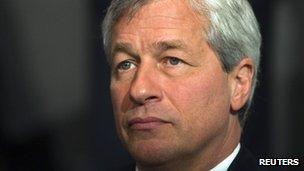JPMorgan shares dive after $2bn trading loss
- Published

JPMorgan's chief executive Jamie Dimon said "many errors" were made
Shares in JPMorgan Chase have dived 9% after the biggest US bank, revealed a trading loss of at least $2bn (£1.2bn).
Chief executive Jamie Dimon blamed "errors, sloppiness and bad judgement" for the losses and warned "it could get worse".
In reaction to the loss, the company's credit rating was downgraded by the agency Fitch.
US media reports say that market regulators have already begun an investigation into the losses.
According to the New York Times, the Securities and Exchange Commission is looking at JPMorgan's accounting practices and the way it updated the markets about the loss making trades.
The report stresses that the investigation is at an early stage and no-one at JPMorgan has been accused of wrongdoing.
Mary Schapiro, the head of the Securities and Exchange Commission (SEC), said that "all the regulators are focused on this".
But she did not give any more details about the actions of her agency.
Credit rating agency Fitch said the scale of the loss was "manageable".
But it also said the size of the trade and the fact the situation was ongoing, implied that was proving difficult for JPMorgan to fix the problem.
As a result Fitch downgraded JPMorgan's debt by one notch, and said that another downgrade could be possible in the next six months.
JPMorgan's losses undermined confidence in other US banking shares.
Citigroup closed 4.2% lower, Goldmans Sachs fell 3.9% and Morgan Stanley lost 4.2%.
US politicians have called for action.
Senator Bob Corker, a senior Republican on the Senate banking committee, called for a hearing into the losses as quickly as possible.
"Are we confident that taxpayers are fully protected from losses at major financial institutions," he asked in a letter to the head of the Senate banking committee.
'Self-inflicted'
Overall, after accounting for other gains, losses at JPMorgan's chief investment office (CIO) are estimated to come in at $800m in the second quarter.
The strategy taken at the CIO unit, run by Ina Drew in New York and Achilles Macris in London, had been "riskier, more volatile and less effective" than previously believed, Mr Dimon said.
"These were egregious mistakes," he said. "They were self-inflicted and this is not how we want to run a business.
"It could get worse," he warned. "This could go on for a little bit."
He said the risky hedging strategy could cost the bank an additional $1bn.
The CIO is an arm of the bank used to make broad bets to hedge its portfolios of individual holdings. Hedging is an investment practice used to reduce the risk of price fluctuations to the value of an asset.
Attention has focused on the activities of Bruno Michel Iksil, a London-based JPMorgan trader known as the London Whale, who reportedly made big bets on the financial markets as part of this hedging strategy.
A report said that Mr Iksil was also nicknamed Voldemort, the nemesis of Harry Potter in the hugely successful books and films, due to his power within the markets.
A source close to the bank told the BBC: "We're not talking about a rogue trader here. His was one trade in a big portfolio of trades. It was a global hedging strategy known by the bank but executed poorly. It failed."
'Too big to fail'
Peter Thal Larsen, assistant editor at Reuters Breaking Views, told the BBC: "Because JP Morgan is seen as one of the best run banks, it is a blow to all banks. If we can't trust JP Morgan to get this right, then we can't trust anyone else either."
"There will be a renewed drive for politicians and for regulators to say, 'Let's make sure we restructure this industry, so that when banks get into trouble and lose a lot of money, we can be sure that we can wind them down and taxpayers don't have to bail them out,'" he said.
The trading loss, <link> <caption>revealed in a regulatory filing,</caption> <url href="http://www.sec.gov/Archives/edgar/data/19617/000001961712000213/jpm-2012033110q.htm" platform="highweb"/> </link> is expected to hurt JPMorgan's overall earnings in the quarter, and will come as an embarrassment to the bank.
It had emerged from the 2008 financial crisis in much better health than many of its rivals after avoiding risky investments that had hurt others.
"We will admit it, we will learn from it, we will fix it, and we will move on," Mr Dimon said.
He added that the bank was trying to unload the portfolio in question in a "responsible" manner in order to minimise the cost to shareholders.
Mr Dimon said the type of trading that led to the loss would not be banned by the so-called Volcker rule, designed to censure certain types of trading by banks with their own money.
But he acknowledged that the errors would be particularly embarrassing, given his public criticism of the Volcker rule.
"It plays right into the hands of a bunch of pundits out there, but that's life," he said.